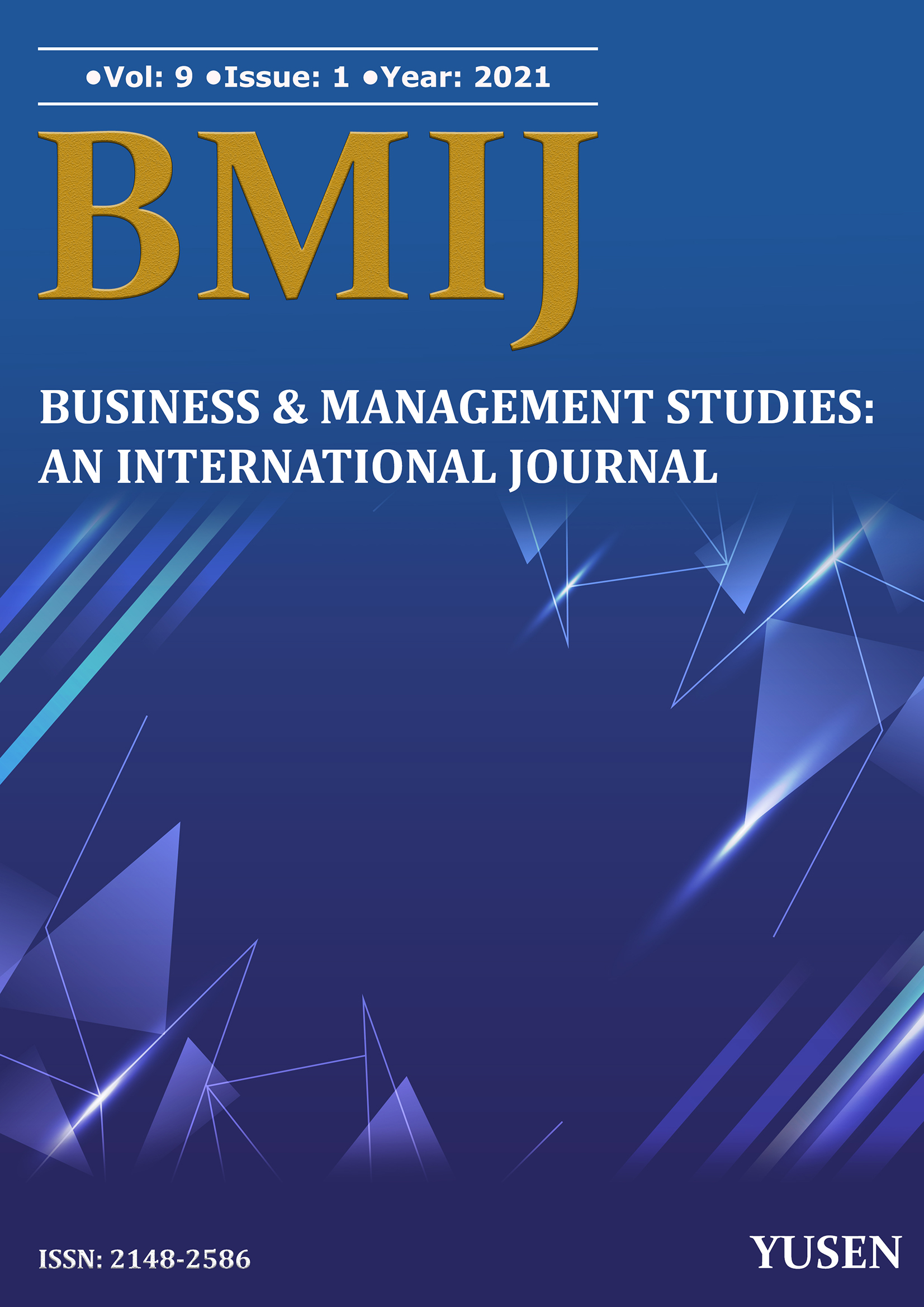
Published 2021-03-25
Keywords
- İnsanî Gelişme, Çalışma Saatleri, Genelleştirilmiş Tahmin Denklemleri
- Human Development, Work Hours, Generalized Estimate Equation
How to Cite
Copyright (c) 2021 Murat Dinçer- Seda Bağdatlı Kalkan

This work is licensed under a Creative Commons Attribution-NonCommercial-NoDerivatives 4.0 International License.
Abstract
The countries' development levels have been handled differently until today, especially after the Industrial Revolution; the countries' development has been tried to be measured by the gross domestic product amounts. This is especially true of II. It has been criticized a lot with the understanding of human rights that developed after World War II, and the Human Development Report was published for the first time in 1990 by the United Nations. Although the Human Development Index calculations included in this report have been criticized in many different ways, they have been deemed necessary on the basis that they are based on a new understanding of development and development. Based on the calculations made with this index, the relationship of human development with many different factors has been examined. In this study, the relationship between human development and working hours has been analyzed using the Generalized Estimation Equations method. In the study, the data of 35 countries that are members of the Organisation for Economic Co-operation and Development between 2010-2017 were used. As a result of the study, an inverse relationship between working hours and human development index components was determined. These findings make the current understanding of work controversial. At this point, it is clear that a new productivity-oriented paradigm is needed in individual and social life.
Downloads
References
- Akhtar, S., Kashif, A., Arif, A., & Khan, M. A. (2012). Impact of long working hours on family wellbeing of corporate family. World Applied Sciences Journa, 16(9), 1302-1307.ta
- Collowet, M., & Sauermann, J. (2019). Working hours and productivity. Maastricht: Research Centre for Education and the Labour Market.
- Çalışkan, N. (2013). Genelleştirilmiş tahmin denklemleri ve regresyon ile başarı kestirimlerinin karşılaştırılması. Yayınlanmamış Doktora Tezi. Ankara: Hacettepe Üniversitesi Eğitim Bilimleri Enstitüsü Eğitim Bilimleri Anabilim Dalı Eğitimde Ölçme ve Değerlendirme Bilim Dalı .
- Fursman, L. (2009). Parent's long work hours and the impact on family life. Social Policy Journal of New Zealand(35), 55-67.
- Halekoh, U., Hojsgaard, S., & Yan, J. (2006). The R package geepack for Generalized Estimate Equations. Journal of Statistical Software, 15(2), 1-11.
- Jorgenson, A. K., Fitzgerald, J. B., Thombs, R. P., Hill, T. D., Givens, J. E., Clark, B., . . . Ore, P. (2020). The multiplicative impacts of working hours and fine particulate matter concentration on life expectancy: A longitudinal analysis of US States. Environmental Research, 191. doi:https://doi.org/10.1016/j.envres.2020.110117
- Kılıç, S., & Çilingirtürk, A. M. (2012). Genelleştirilmiş tahmin denklemlerinde entropye dayalı korelasyon matrisi yaklaşımı: Türk bankacılık sektörü uygulaması. Anadolu Üniversitesi Sosyal Bilimler Dergisi, 13(2), 91-100.
- Klafke, R. (2017). The relationship between the human development index, free time and weekly hours worked by the Brazilian population. Rev. Guillermo de Ockham, 15(2), 95-101.
- Meydan, M. C., & Sarı, V. İ. (2018). İnsanî Gelişme Endeksi ve Alt Endekslerinin Türkiye’deki İller İçin Ölçülmesi ve Analizi. idealkent, 9(24), 387-429. doi:10.31198/idealkent.450118
- OECD. (2019). Hours worked. 01 03, 2021 tarihinde https://data.oecd.org/emp/hours-worked.htm adresinden alındı
- Rannis, G., Stewart, F., & Samman, E. (2006). Human development: beyon the Human Development Index. Journal of Human Development, 7(3), 323-358. doi:https://doi.org/10.1080/14649880600815917
- Sagar, A. D., & Najam, A. (1998). The Human Development Index: a critical review. Ecological Economics, 25(3), 249-264. doi:https://doi.org/10.1016/S0921-8009(97)00168-7
- Schein, A., & Haruvi, N. (2017). The Relationship between the Average Workweek Length and Per Capita Gross Domestic Product (GDP). International Studies of Management & Organization, 47, 311-323. doi:https://doi.org/10.1080/00208825.2017.1382268
- Şeker, G., Tilbe, A., Ökmen, M., Yazgan Hepgül, P., Eroğlu, D., & Sirkeci, İ. (2015). Londra'da çalışan Türkiyeli göçmenlerin çalışma süreleri ve sosyal ilişkileri. Turkish Migration Conference 2015 Selected Proceedings. Londra: Transnational Press.
- T.C. Kalkınma Bakanlığı Sosyal Sektörler ve Koordinasypn Genel Müdürlüğü. (2011). Türkiye'nin İnsanî Gelişme Endeki ve Endeks Sıralamasının Analizi. Ankara: T.C. Kalkınma Bakanlığı. 12 03, 2020 tarihinde https://sbb.gov.tr/wp-content/uploads/2018/11/Turkiyenin_Insani_Gelisme_EndeksiveEndeksSiralamasininAnalizi.pdf adresinden alındı
- UNDP. (2018). Human Development Indices and Indicators: 2018 Statistical Update. doi:10.17719/jisr.2019.3166
- UNDP. (2019). HUMAN DEVELOPMENT REPORT 2019: Technical notes.
- UNDP. (2020). UNDP Human Development Report. hdr.undp.org: http://hdr.undp.org/en/indicators/137506 adresinden alındı
- UNDP. GNI Per Capita. 01 03, 2021 tarihinde http://hdr.undp.org/en/indicators/141706 adresinden alındı
- UNDP. Human Development Index (HDI). 01 03, 2021 tarihinde http://hdr.undp.org/en/indicators/137506 adresinden alındı
- UNDP. Life expectancy at birth (years). 01 03, 2021 tarihinde http://hdr.undp.org/en/indicators/69206 adresinden alındı
- UNDP. Mean years of schooling (years). 01 03, 2021 tarihinde http://hdr.undp.org/en/indicators/103006 adresinden alındı
- United Nations Development Programme. (2020, 12 05). United Nations Development Programme. United Nations Development Programme: http://hdr.undp.org/en/humandev adresinden alındı
- Usta, D., & Çilingirtürk, A. M. (2018). Bitişme Analizi faydalarının Genelleştirilmiş Tahmin Denklemleri ile belirenmesi. UİİİD-IJEAS, 11-22. doi:10.18092/ulikidince.354777
- Wong, K., Chan, A. H., & Ngan, S. C. (2012). The effect of long working hours and overtime on occupational health: A meta-analysis of evidence from 1998 to 2018. International Journal of Environmental Research and Public Health, 16(12). doi:10.3390/ijerph16122102
- Yiğit, T. (2020). Sosyal hizmetin mesleki kimliği: her koşulda insanlığın yanında olan meslek. Türkiye Sosyal Hizmet Araştırmaları Dergisi, 4(2), 9-19.
- Yonar, H., & İyit, N. (2018). Modeling the causality relationships between Gdp/Gni and electricity consumption according to income levels of countries by Generalized Estimating Equations. Selçuk Üniversitesi Sosyal Bilimler Enstitüsü Dergisi(39), 191-200.


